
A hot-and-sexy college football star turned ne’er-do-well drifter arrives in a sleepy Midwest town circa 1952 and the lives of one family and their friends will never be the same again in William Inge’s American classic Picnic, now being given a pitch-perfect partner-cast revival by The Antaeus Company.
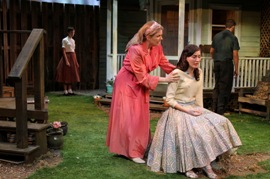 The family in question are The Owens: single mom Flo (Rhonda Aldrich, Eve Gordon), abandoned years ago by a husband who left her to raise two daughters, beautiful eighteen-year-old Madge (Sarah Halford, Jordan Monaghan) and brainy fifteen-year-old Millie (Connor Kelly-Eiding, Jackie Preciado).
The family in question are The Owens: single mom Flo (Rhonda Aldrich, Eve Gordon), abandoned years ago by a husband who left her to raise two daughters, beautiful eighteen-year-old Madge (Sarah Halford, Jordan Monaghan) and brainy fifteen-year-old Millie (Connor Kelly-Eiding, Jackie Preciado).
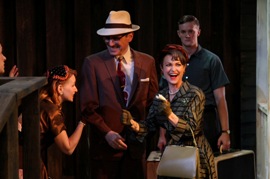 Also finding their lives transformed for better or for worse over a single twenty-four period are spinster schoolmarm Rosemary (Gigi Bermingham, Shannon Holt), desperate to marry out-of-town businessman Howard (Josh Clark, John DeMita); old-maid neighbor lady Mrs. Potts (Kitty Swink, Janellen Steininger), who can’t take her eyes off the shirtless hunk she has just hired to do yard work in exchange for breakfast; and perhaps most importantly where Madge is concerned, her good-looking young businessman boyfriend Alan (Matthew Gallenstein, Ross Philips), who’s initially happy, then not-so-pleased that his former college roommate has come to town.
Also finding their lives transformed for better or for worse over a single twenty-four period are spinster schoolmarm Rosemary (Gigi Bermingham, Shannon Holt), desperate to marry out-of-town businessman Howard (Josh Clark, John DeMita); old-maid neighbor lady Mrs. Potts (Kitty Swink, Janellen Steininger), who can’t take her eyes off the shirtless hunk she has just hired to do yard work in exchange for breakfast; and perhaps most importantly where Madge is concerned, her good-looking young businessman boyfriend Alan (Matthew Gallenstein, Ross Philips), who’s initially happy, then not-so-pleased that his former college roommate has come to town.
That onetime fraternity bro, as any Broadway or movie buff can tell you, is vagabond stud Hal (Daniel Bess, Jason Dechert), who—other options having run out—now sees Alan as his only hope of securing a steady job.
What Hal doesn’t count on is meeting Madge.
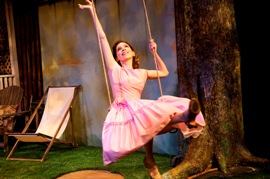 Originally staged on Broadway back in 1953 with a cast that included future movie/stage superstars Paul Newman and Kim Stanley in the featured roles of Alan and Millie, and turned several years later into a Hollywood Movie Classic with a very young Kim Novak as Madge and a youngish William Holden as Hal, Picnic (like other similar plays of the era) is the kind of stage drama that some might describe as “an old chestnut” and others might choose to skip because (to their big-city, 21st-century minds) who really wants to spend two hours with a bunch of small-town—and presumably small-minded—Kansans?
Originally staged on Broadway back in 1953 with a cast that included future movie/stage superstars Paul Newman and Kim Stanley in the featured roles of Alan and Millie, and turned several years later into a Hollywood Movie Classic with a very young Kim Novak as Madge and a youngish William Holden as Hal, Picnic (like other similar plays of the era) is the kind of stage drama that some might describe as “an old chestnut” and others might choose to skip because (to their big-city, 21st-century minds) who really wants to spend two hours with a bunch of small-town—and presumably small-minded—Kansans?
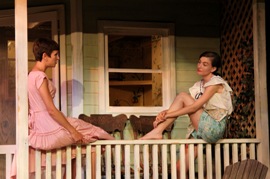 As both Antaeus casts make amply clear, theater snobs like these would be dead wrong.
As both Antaeus casts make amply clear, theater snobs like these would be dead wrong.
Still waters run deep indeed in the characters Inge has created, whether it is Mrs. Potts, chained for life to a mother from hell yet still longing for all she’s missed out on in life, or Rosemary, who has seen herself go seemingly overnight from eighteen to forty and can’t bear the thought of another year of hopeless singlehood, or golden boy Alan, whose all-American goodness may harbor a darker side if you dig just a bit beneath the surface.
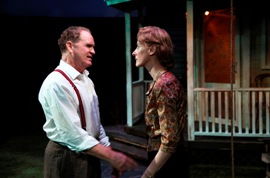 As for the Owens clan, Flo may seem all Harriet Nelson on the surface (albeit minus Ozzie and with two daughters instead of sons), but Harriet never had to live in terror of what would happen when David and Ricky flew the coop the way Flo does about her two girls’ eventual departure. Millie may be acing all her tests, but it’s no fun living in the shadow of a beautiful older sister, which adds a jealous, even spiteful edge to her already feisty nature. As for Madge, the older Owen girl may be all gorgeous perfection on the outside, but even being pretty has its downsides, especially in mid-20th-century Middle America where a young woman’s only future lay in marriage.
As for the Owens clan, Flo may seem all Harriet Nelson on the surface (albeit minus Ozzie and with two daughters instead of sons), but Harriet never had to live in terror of what would happen when David and Ricky flew the coop the way Flo does about her two girls’ eventual departure. Millie may be acing all her tests, but it’s no fun living in the shadow of a beautiful older sister, which adds a jealous, even spiteful edge to her already feisty nature. As for Madge, the older Owen girl may be all gorgeous perfection on the outside, but even being pretty has its downsides, especially in mid-20th-century Middle America where a young woman’s only future lay in marriage.
Perhaps most complex and conflicted all is Hal, blessed with movie star looks and a sports-and-physical labor-cultivated bod but cursed with a wrong-side-of-the-tracks upbringing and some just plain bad luck, a recipe for trouble if there ever was one where women are concerned.
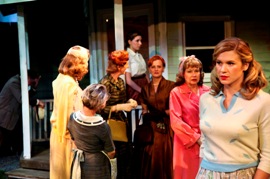 Unlike today’s more budget-conscious playwrights, Inge lived in an era in which money was far less of an object, meaning that the Picnic ensemble gets enriched by a trio of cameo roles that enhance setting and context—Millie’s nemesis, plucky paperboy Bomber (Jake Borelli and Ben Horwitz), and Rosemary’s less jaded fellow schoolteachers Irma Kronkite (Dylan Jones and Tamara Krinsky) and Christine Schoenwalder (Maureen Lee Lenker and Jill Maglione).
Unlike today’s more budget-conscious playwrights, Inge lived in an era in which money was far less of an object, meaning that the Picnic ensemble gets enriched by a trio of cameo roles that enhance setting and context—Millie’s nemesis, plucky paperboy Bomber (Jake Borelli and Ben Horwitz), and Rosemary’s less jaded fellow schoolteachers Irma Kronkite (Dylan Jones and Tamara Krinsky) and Christine Schoenwalder (Maureen Lee Lenker and Jill Maglione).
Family vs. freedom, love vs. duty, beauty vs. brains, and the loneliness that life choices can bring—all of these themes make Picnic the great, if sadly all-too-unsung play it has been for the last sixty-plus years, and all of them come to life on the Antaeus Company stage under Cameron Watson’s truly inspired direction with a pair of radically different, equally unbeatable casts, both of which must be seen if you love great theater as much as I do.
One reason Antaeus partner casting makes a repeat visit such a particular pleasure is just how distinctive each acting pair is—dark-haired vs. blonde; statuesque vs. petite, bulgingly muscled vs. lean-and-hard, and so on. And though Elizabeth Taylor and Debbie Reynolds would likely never have been up for the same role (or man—except in real life) back in the 1950s, on alternate nights, Antaeus throws “type-casting” notions to the wind and lets each one’s 21st-century equivalent get the part.
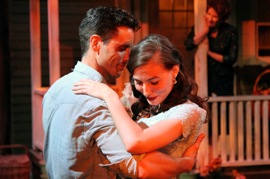 Leading the “Stuffed Peppers” cast, Monaghan’s sultry Madge hides oceans of depth beneath her Hitchcock Brunette cool. As Hal, Bess keeps us rooting for the good man we sense hiding under his exotic outsider looks. Gordon’s fierce but life-worn Flo still reveals hints of the high school beauty she must once have been. Bermingham gives us a Rosemary whose hard-as-nails exterior cannot mask a wounded soul not yet willing to give up hope. Town golden boy Alan is brought to life by a broad-shouldered All-American Philips. Kelly-Eiding’s Millie is a long-legged foal on her way to greatness once she gets past the awkward age. Swink’s Mrs. Potts seems to have had all the color washed out of her till Hal’s arrival brings some of it back. DeMita gives Howard enough of an edge to keep us guessing about his feelings for Rosemary. Horwitz’s boyish tough guy of a Bomber and Krinsky and Lenker’s perfectly (mis-)matched Irma and Christine complete the all around splendid Peppers.
Leading the “Stuffed Peppers” cast, Monaghan’s sultry Madge hides oceans of depth beneath her Hitchcock Brunette cool. As Hal, Bess keeps us rooting for the good man we sense hiding under his exotic outsider looks. Gordon’s fierce but life-worn Flo still reveals hints of the high school beauty she must once have been. Bermingham gives us a Rosemary whose hard-as-nails exterior cannot mask a wounded soul not yet willing to give up hope. Town golden boy Alan is brought to life by a broad-shouldered All-American Philips. Kelly-Eiding’s Millie is a long-legged foal on her way to greatness once she gets past the awkward age. Swink’s Mrs. Potts seems to have had all the color washed out of her till Hal’s arrival brings some of it back. DeMita gives Howard enough of an edge to keep us guessing about his feelings for Rosemary. Horwitz’s boyish tough guy of a Bomber and Krinsky and Lenker’s perfectly (mis-)matched Irma and Christine complete the all around splendid Peppers.
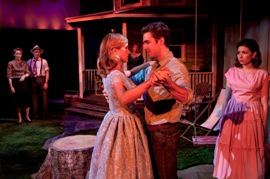 As for the “Deviled Eggs,” Halford’s Madge and Gallenstein’s Alan appear at first to be so much the quintessential Midwest blond-and-blue-eyed couple that her inner savage just aching to break free and his inwardly twisted rich boy come as that much more of a surprise, while Dechert’s boy-next-door-adjacent Hal could easily fit into Alan’s privileged shoes had life dealt him different cards. Aldrich’s Flo seems so authentically Great Plains that she could have walked right in from a Kansas town (pop. 600) like the one the actress grew up in. Holt invests Rosemary with her own trademark quirks and a pain that devastates opposite Clark’s Howard, so folksy you’d expect him to show up in an episode of The Waltons. Preciado’s Millie is a not-so-ugly duckling who doesn’t realize she’s about to become a swan. Steininger gives her petite Mrs. Potts a pixyish quality underneath her drab exterior. Borelli’s irresistibly perky Bomber and Jones and Maglione’s pair of schoolmarms, one worldly and one wet around the gills, complete the equally superb Eggs.
As for the “Deviled Eggs,” Halford’s Madge and Gallenstein’s Alan appear at first to be so much the quintessential Midwest blond-and-blue-eyed couple that her inner savage just aching to break free and his inwardly twisted rich boy come as that much more of a surprise, while Dechert’s boy-next-door-adjacent Hal could easily fit into Alan’s privileged shoes had life dealt him different cards. Aldrich’s Flo seems so authentically Great Plains that she could have walked right in from a Kansas town (pop. 600) like the one the actress grew up in. Holt invests Rosemary with her own trademark quirks and a pain that devastates opposite Clark’s Howard, so folksy you’d expect him to show up in an episode of The Waltons. Preciado’s Millie is a not-so-ugly duckling who doesn’t realize she’s about to become a swan. Steininger gives her petite Mrs. Potts a pixyish quality underneath her drab exterior. Borelli’s irresistibly perky Bomber and Jones and Maglione’s pair of schoolmarms, one worldly and one wet around the gills, complete the equally superb Eggs.
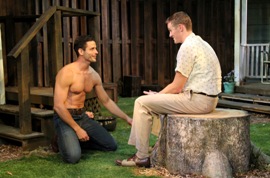 It’s hard to imagine a more gorgeously designed Picnic than the one on the Antaeus stage, from scenic designer Robert Senader’s stunning detailed set (even the interior rooms are impeccably appointed, thanks to properties designer Adam Meyer), to Terri A. Lewis’s absolutely gorgeous, character-revealing early-1950s costumes, to Jeff Gardner’s sensational sound design, one that gives us the whistle of a passing train, music from a distant picnic, and car doors opening and shutting from way back behind the house. Perhaps most remarkable of all is Jared A. Sayeg’s lighting design, one that takes us from daytime to twilight to sunset to night and then back again to morning in seamless transitions interrupted only by intermission.
It’s hard to imagine a more gorgeously designed Picnic than the one on the Antaeus stage, from scenic designer Robert Senader’s stunning detailed set (even the interior rooms are impeccably appointed, thanks to properties designer Adam Meyer), to Terri A. Lewis’s absolutely gorgeous, character-revealing early-1950s costumes, to Jeff Gardner’s sensational sound design, one that gives us the whistle of a passing train, music from a distant picnic, and car doors opening and shutting from way back behind the house. Perhaps most remarkable of all is Jared A. Sayeg’s lighting design, one that takes us from daytime to twilight to sunset to night and then back again to morning in seamless transitions interrupted only by intermission.
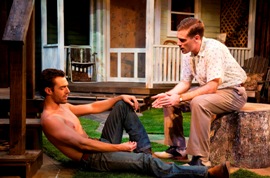 Fight director Edgar Landa makes a couple of tussles seem absolutely real, while choreographer Jean Michelle Sayeg gives us a mating dance that can provoke both romantic sighs and a few amused laughs depending on who’s doing the mating.
Fight director Edgar Landa makes a couple of tussles seem absolutely real, while choreographer Jean Michelle Sayeg gives us a mating dance that can provoke both romantic sighs and a few amused laughs depending on who’s doing the mating.
Kristin Weber is production stage manager and Emily Lehrer assistant stage manager. Amandla Jahava and Jaemyeong Lee are assistant directors.
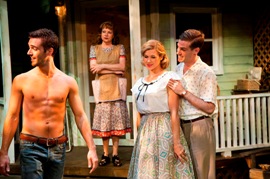 Additional deserved program credits go to Christopher Breyer (dramaturg), Emyli Gudmundson (rehearsal stage manager), Weber and Portia Juliette (wardrobe), Meyer (master electrician, production manager), Grove Scenery (set construction), and Orlando de la Paz (scenic painter).
Additional deserved program credits go to Christopher Breyer (dramaturg), Emyli Gudmundson (rehearsal stage manager), Weber and Portia Juliette (wardrobe), Meyer (master electrician, production manager), Grove Scenery (set construction), and Orlando de la Paz (scenic painter).
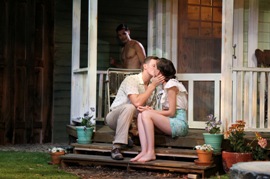 Picnic is the third William Inge play I’ve had the good fortune to review in the past fourteen months, and in director Watson and his crackerjack creative team’s hands, it stands as the finest of Inge’s Midwest dramas.
Picnic is the third William Inge play I’ve had the good fortune to review in the past fourteen months, and in director Watson and his crackerjack creative team’s hands, it stands as the finest of Inge’s Midwest dramas.
Los Angeles theatergoers should not miss this chance to see one of the 20th century’s truly great works of theater done exactly as it should be done on the Antaeus Company stage.
The Antaeus Company, 5112 Lankershim Blvd., North Hollywood.
www.Antaeus.org
–Steven Stanley
June 26, 2015
Photos: Karianne Flaathen (Stuffed Peppers), Geoffrey Wade (Deviled Eggs)
Tags: Los Angeles Theater Review, The Antaeus Company, William Inge



 Since 2007, Steven Stanley's StageSceneLA.com has spotlighted the best in Southern California theater via reviews, interviews, and its annual StageSceneLA Scenies.
Since 2007, Steven Stanley's StageSceneLA.com has spotlighted the best in Southern California theater via reviews, interviews, and its annual StageSceneLA Scenies.







 COPYRIGHT 2025 STEVEN STANLEY :: DESIGN BY
COPYRIGHT 2025 STEVEN STANLEY :: DESIGN BY